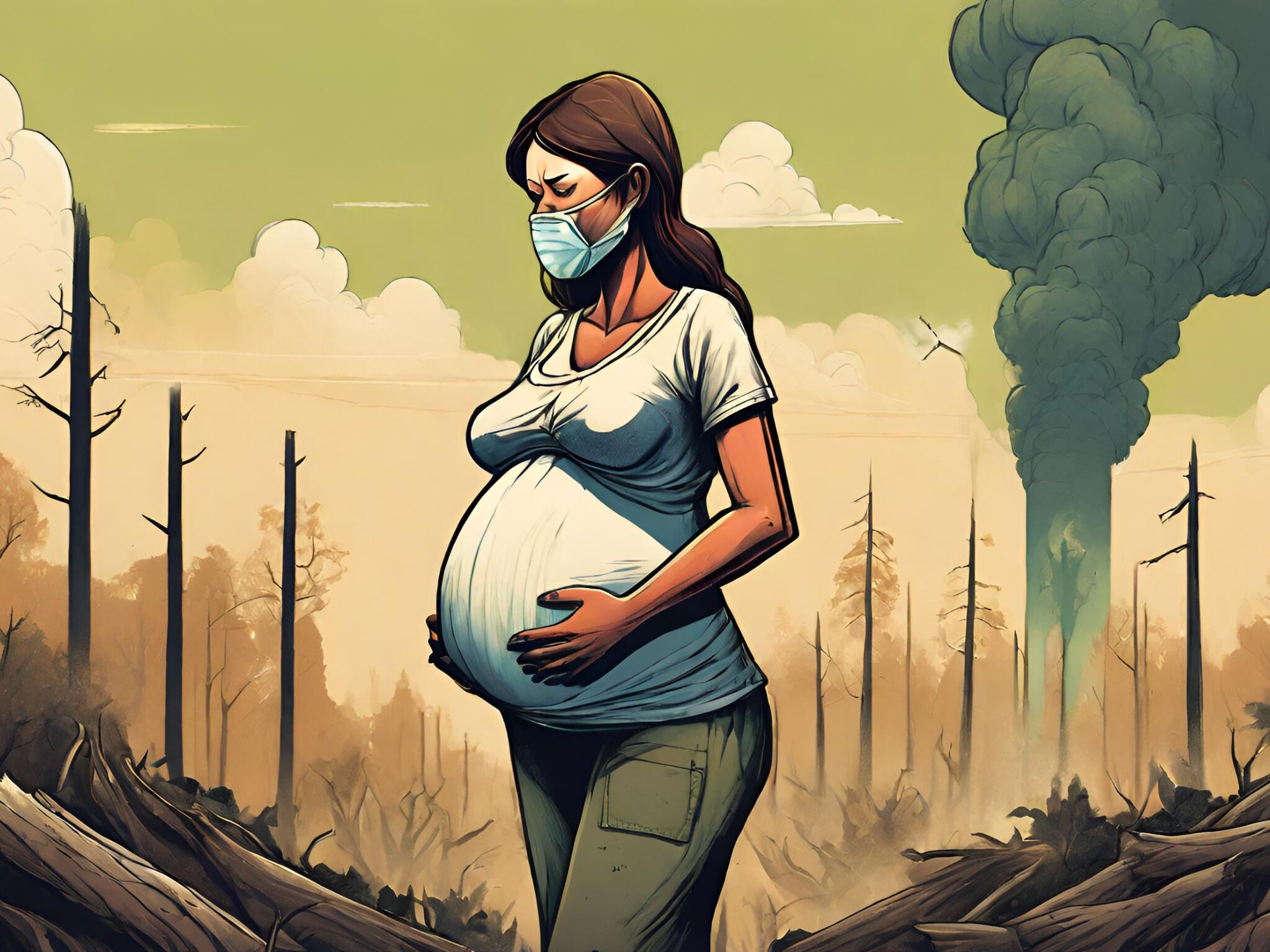
The authors of a new book, ‘The Conceivable Future’, discuss how people are thinking about family planning in a time of climate change.
By Daisy Simmons
A particular sort of demographic thing was going on for us both — you know, the finger-wagging around children,” says Meghan Elizabeth Kallman, remembering the period of her life when she met Josephine Ferorelli at a party. It was 2014.
Both 30, they bonded quickly over the pain of deciding whether to have children at a time when the climate crisis was bad and getting worse.
“People have been dealing with all this horrible stuff privately. It wasn’t being talked about out in the open, but it was being understood and felt on a personal level,” Ferorelli says.
Inspired by shared conviction, the friends soon launched Conceivable Future, an organization that aims to bring awareness to the fact that climate change is now a major factor in family planning for many people.
Now 10 years and hundreds of facilitated conversations in privately hosted house parties later, they’ve written “The Conceivable Future: Planning Families and Taking Action in the Age of Climate Change,” a book brimming with fresh insight on how reproductive issues are intricately linked with climate change. It also grapples with the dark side of “population control” rhetoric, which disproportionately tasks those who can get pregnant with solving the climate crisis.
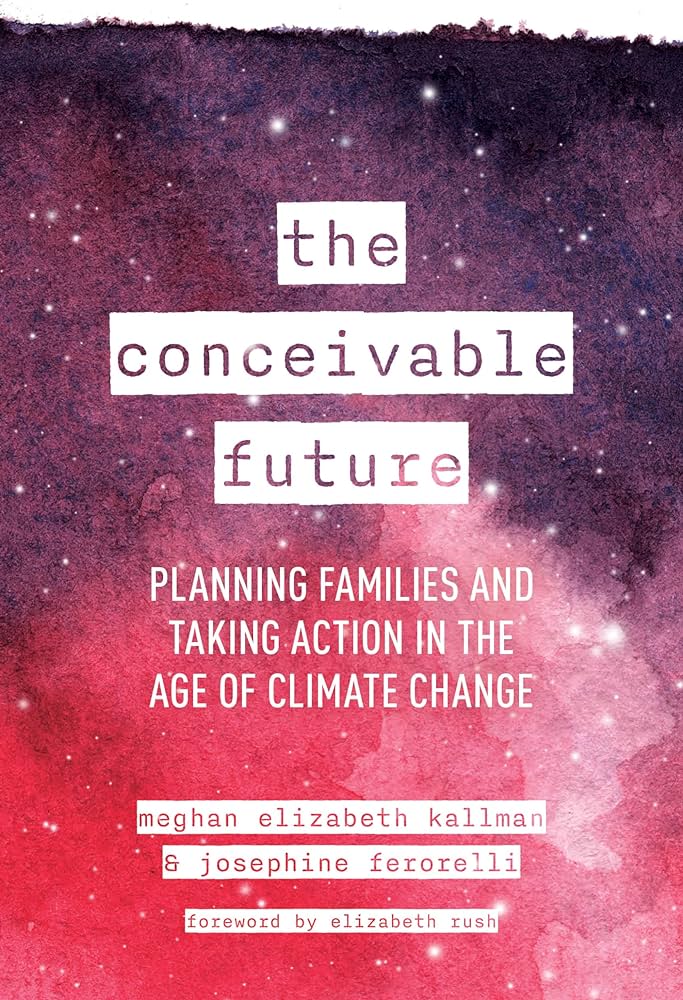
I sat down to a video chat with the authors to discuss the “climate baby dilemma,” why they say there’s no “family-based fix for an ecological catastrophe,” and how joining others in climate action is far more powerful than any individual choice, reproductive or otherwise.
This interview has been lightly edited and condensed.
Yale Climate Connections: “Conceivable Future” begins by addressing an increasingly common question: “Can I have a child in the age of climate crisis?” Could you talk about why you call this an Impossible Question?
Meghan Elizabeth Kallman: Because there’s no correct answer to an impossible question. So when we first started, all the coverage was completely obsessed with what the right answer to this question is. There’s all this like, “Should you do this? Should we do that? Is it permissible?” That’s not the point.
There are a million and a half reasons why people all over the world can or can’t make actual decisions about what’s going on in their bodies — whether to have children or how many children to have. Some of those reasons have to do with access to health care, with body chemistry, with living close to contaminants. There’s any number of reasons and we’re not going to get in the middle and judge people more for all of the challenges they’re already living.
So for us, the only answer to this question is to try to make the world safer and more habitable for everybody’s children — whether I have six and Josephine has none, or vice versa or whatever.
Frankly, it’s taken a decade to get us beyond this, “Should you or shouldn’t you?” question. Because that’s not the point. The point is we have some serious problems that are bearing down on many generations’ ability to live well. And the broader point is that nobody makes reproductive decisions freely in the face of so much harm, much of it sponsored by our own governments in the form of fossil fuel subsidies.
So the question is not, “Should I or shouldn’t you?” That matters to everybody on an individual level, but the political move is to try to figure out what we can do to make this less of a problem for all of us. We’re trying to redirect from this narrow tunnel vision version of like, “Should Daisy have a kid? Is it unethical for her to have three?” That’s not interesting to us.
What’s interesting is trying to create a world in which Daisy — to the best of Daisy’s ability — can pick a life that works for her, and I can pick a life that works for me and Josephine can pick a life that works for her, and everybody in my community can do the same, and that we are as [supported] as we can possibly be by systems of health care, by systems of nutrition, by habitable climate, by safe housing, all that kind of stuff.
Josephine Ferorelli: We also want to acknowledge and really honor the fact that being together can, to some extent, help soften this burden. There’s nothing we can do to forestall the dark nights of the soul that people might have while they try to figure out what their own future looks like in this pretty dangerous moment.
But there’s also this really well-documented tradition of leadership, and fossil fuel PR particularly, trying to reframe political issues as moral ones that are to be wrestled with alone. And while you’ve got people isolated and hand-wringing about there being some right answer that they just can’t seem to make or understand about whether or not it’s safe to reproduce, or it’s ethical to reproduce, the same forces are making it much more dangerous for everybody to reproduce whether they’re interested in doing so or not. So finding political meaning in this is really the only libratory thing we can do when presented with the impossible question, right?
We’ve been focusing on getting these conversations out of the realm of the individual, because [even though] we experience this fear, anxiety, hope, dread — everything on a deeply personal level — the meaning we make out of it is collective and this is political. So we’re not looking for an answer but rather a way of making political meaning out of the Impossible Question that says, “No, actually, you’re not burdened with finding a way to fix the climate crisis with your own reproductive life.”
Because it’s easier for us culturally to tell people and women specifically not to have children than it is to tell fossil fuel companies that there’s a price to CO2 pollution and that there’s a real deadline to the harm they can do.
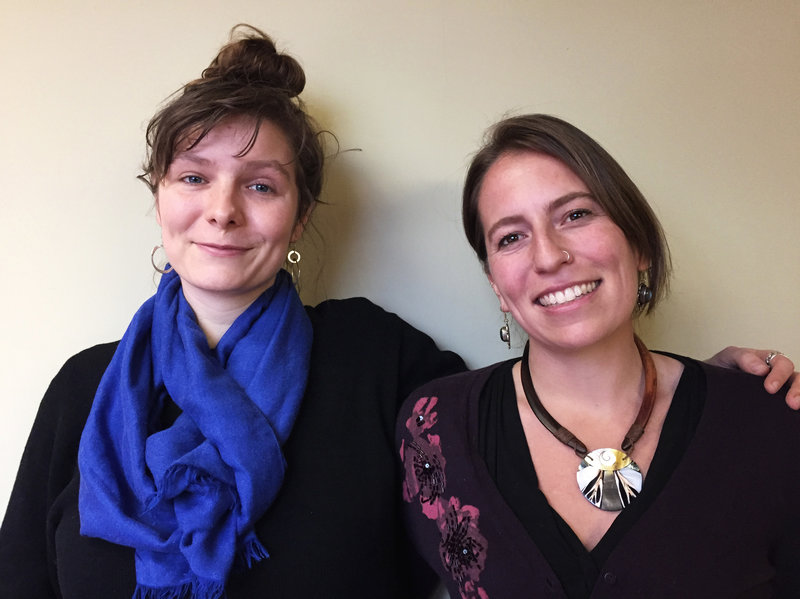
YCC: You write that as young organizers, you felt a coldness in the climate movement — and wanted to find its heart. How do reproductive questions help “reveal the heart” of the climate story?
Kallman: When I first got involved in climate organizing, it was just very technical with a lot of hand-wringing about why there wasn’t mass mobilization. But you can’t expect mass mobilization when people can’t see what matters to them. What they could see then were lots of pictures of icebergs and endangered species — which are obviously important — but there wasn’t much opportunity for ordinary young people to look at ourselves and say, “This is what’s at stake for me.”
In the book we talk about how it reveals questions about our hopes for the future, [and] how we care for a world that is increasingly fraught. Looking at the climate crisis through a lens of reproduction helps us see what we care about.
Ferorelli: Focusing on reproduction in a climate context allows us to make this reversal from something that feels way out there, on an inhuman scale, to the very human stakes of the crisis. I think that was missing. But reproduction, family planning, intergenerational relationships, are the ways that we understand the climate crisis at our own scale instead of the inhuman scale that the crisis itself proposes.
YCC: You write about how people contemplating “the climate baby dilemma” are often concerned with two main questions: What harm will the world do to my baby? What harm will my baby do to the world? Could you talk about this latter question that considers, as you write, “babies as carbon sins” and the broader idea of “population control” as a climate solution?
Ferorelli: There’s been a long history of naming population control as a solution to all manner of social ills. It used to be things about poverty and drunkenness and mental illness — it could all be fixed, said the elite, if the poor would just, you know, have fewer babies, basically.
This idea of population control as a solution snaked its way through popular discourse for hundreds of years and has arrived as an environmental solution. But it’s a bogus one because it blames the people who are doing the least harm for the harms of the wealthy.
We used to talk about how, if everybody consumed like a middle-class American, we would need four to six more Earths-worth of stuff to sustain that level of consumption. So we already knew that Western levels of consumption were out of step with what average human life requires.
But even that just got blown out of the water while we were researching this book, because we hadn’t considered this question that, even within American consumption, there’s this massive gap between the superwealthy and everybody else. Our lives are already conditioned to be much, much more resource-intensive than they need to be. But if everybody consumed like the top 20 wealthiest billionaires, then we would need something like 84 more Earths worth of resources.
And so the idea that there’s you know, people in let’s say, Tanzania or people in rural America or people in whichever group has been focused on by an NGO to try and curb the population because it’s in some way an environmental problem — it’s absurd, and it’s quite evil, the misdirection that’s involved in sustaining the population as climate solution conversation in the face of the harm of economic inequality.
Kallman: There are two additional pieces to this that are really important. First is that women’s bodies exist for more reasons than just whatever end is being conceived of by the elite as the desirable end — so this idea that ‘We should make abortion or contraception accessible to women’ [is] a climate solution. Women have been working for this and organizing this for many, many years [separate from the climate movement]. Using reproducing bodies as a means to an end, I think, is total bullshit.
The other thing is that the United States is functionally an antinatalist society anyway. The particular irony and pain around this — and especially as population control measures relate to U.S. public policy attitudes toward poor people in our own country — is that once children are born, there’s nothing that we offer them. We don’t have health care. Medical debt is the No. 1 cause of bankruptcy. There are child care deserts, food deserts, school shootings all over the place, massive amounts of state-led violence, and all sorts of contaminants in our air and water. The fact that we don’t have [guaranteed] parental leave, our maternal mortality rates are the highest in the wealthy world — all of this is insult to injury.
Because this idea that we’re going to curb population somehow and in so doing, fix the climate crisis? The whole argument is nonsense. We’d be better served for many, many ethical and moral reasons, but also practical ones, in making the world safer and healthier for the children that already exist here.
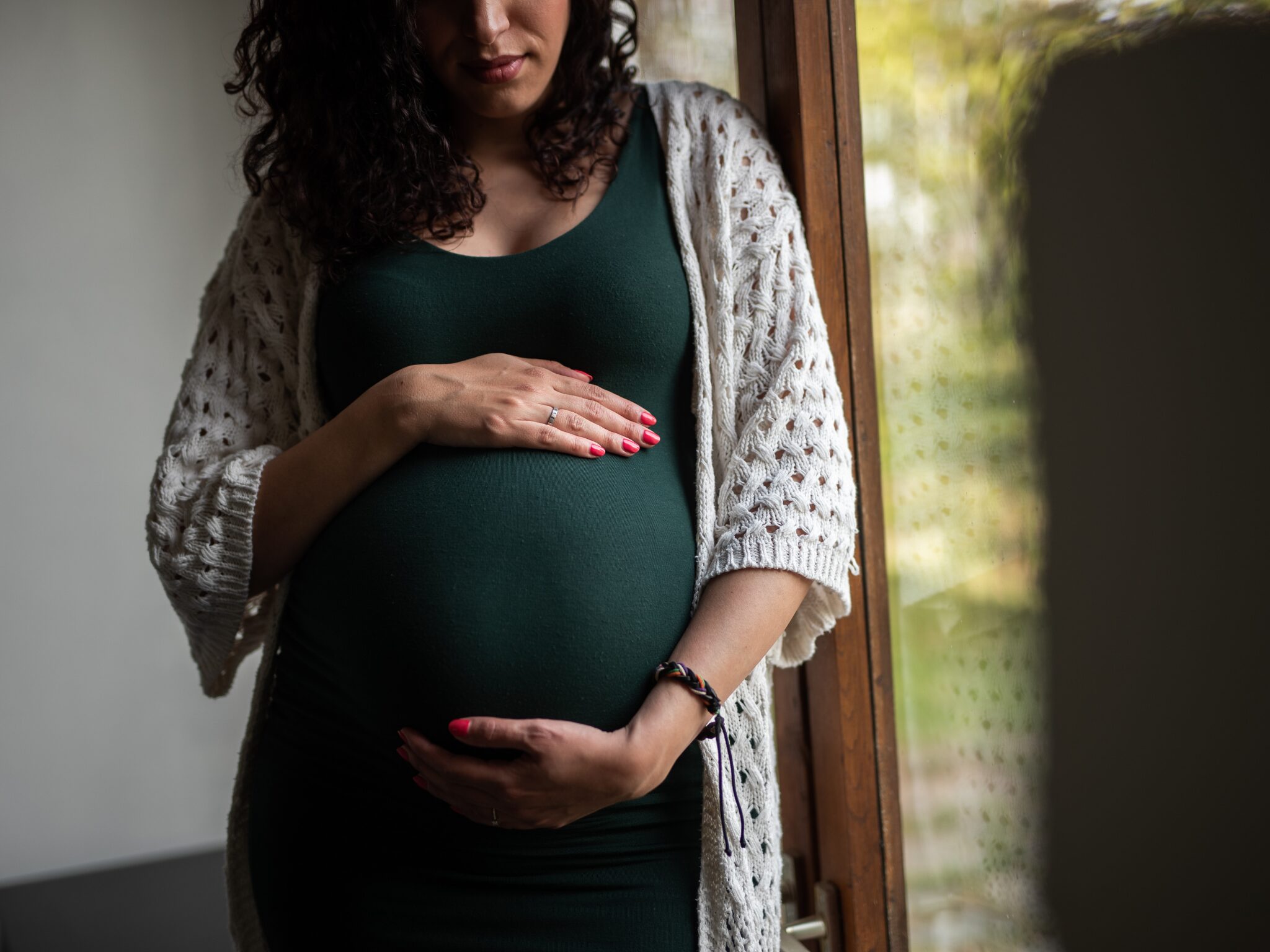
YCC: That idea of looking at new ways to “fix the climate crisis” really comes alive in part two of your book, where you shift gears into more of an action-oriented guidebook. Please tell us about the decision to shift from the focus on the “Impossible Question,” to bigger-picture action strategies.
Kallman: Part of our aim here has always been to use the personal experience as an on-ramp into something collective. That’s what we do. We help folks get in touch with what it is that they’re experiencing. And then we try to make that move from like, “OK, here’s my point of conflict, pain, joy, whatever it is. Who else in my community is doing something that I care about?”
Which is the second half of our book. How do we become bigger than the challenges we face? And then the feelings that we have about our own lives: Those feelings are information, they’re a door in, they’re an on-ramp. There’s been a lot of talk about climate feelings and climate grief lately, which is super important. We’re really glad to recognize that, but you can’t bottom out talking about feelings — feelings are the beginning. The action is what we’re after.
We were both born in 1983. And so, we came of age at a time where collective action was not a large part of the public discourse. That’s what we’re trying to help people think through and realize, and that’s why we have chapters in the latter half of the book that are intended to help people see themselves as part of a larger unit, whether that’s your family, your community, or an organizing group.
Because when you do a project, it has to be bigger than you. This is not about your own consumption habits. This is a project. It has to be done collectively. And so we’re trying to help people sort of train up that muscle that, you know, I have my feelings about this and then my feelings inform my actions in this broader political sphere.
YCC: In the last couple of chapters, you lay out a range of specific next steps, organized around the idea that many people tend to identify as a “yes person” or a “no person.” The Big No is about stopping bad things from happening, where the Big Yes is about helping good things happen. Can you talk a little more about the difference between these themes and why you structured things in this way?
Kallman: The Big No is saying, “We don’t want this compressor station here — or anywhere.” It’s not NIMBYISM, it’s not, we’re chasing it out of my neighborhood. This is, we need a world that doesn’t require natural gas compressor stations. The Big Yes is like, what good stuff do we need in the world to help get us faster to the outcome that we want?
And they’re both important. Both of us are frustrated with this idea that climate [discussion] should always be [either] positive and cheerful, or just saying no to everything. It’s both. We need all of these things.
YCC: And all of the people to do those things, in complementary ways, right?
Ferorelli: Yeah, I think the beauty of this as a framework is you can pick one if someone else is going to do another. You’ve got to accept you’re part of an ecosystem; no one can do this alone. I like that without much further explanation people tend to have an intuitive sense if they’re a yes or a no person. It’s kind of a funny exercise in a group, and I also like that it helps you appreciate that your strengths are not everyone’s strengths. The stuff that seems tedious or tone-deaf or stupid to you is not the same for everybody — we can all slot in the way that makes sense for us.
Kallman: The other piece I would add there is that often people ask, but what can I do? The answer is you can find other people and get together. No amount of washing your plastic bags or riding your bike, whatever it is, no amount of that is enough to change systems; changing systems is a collective process. So the one answer to the question, ‘What can I do?’ is find other people to do a project with or find people who are doing a project and get involved with that. That’s the single most important answer.
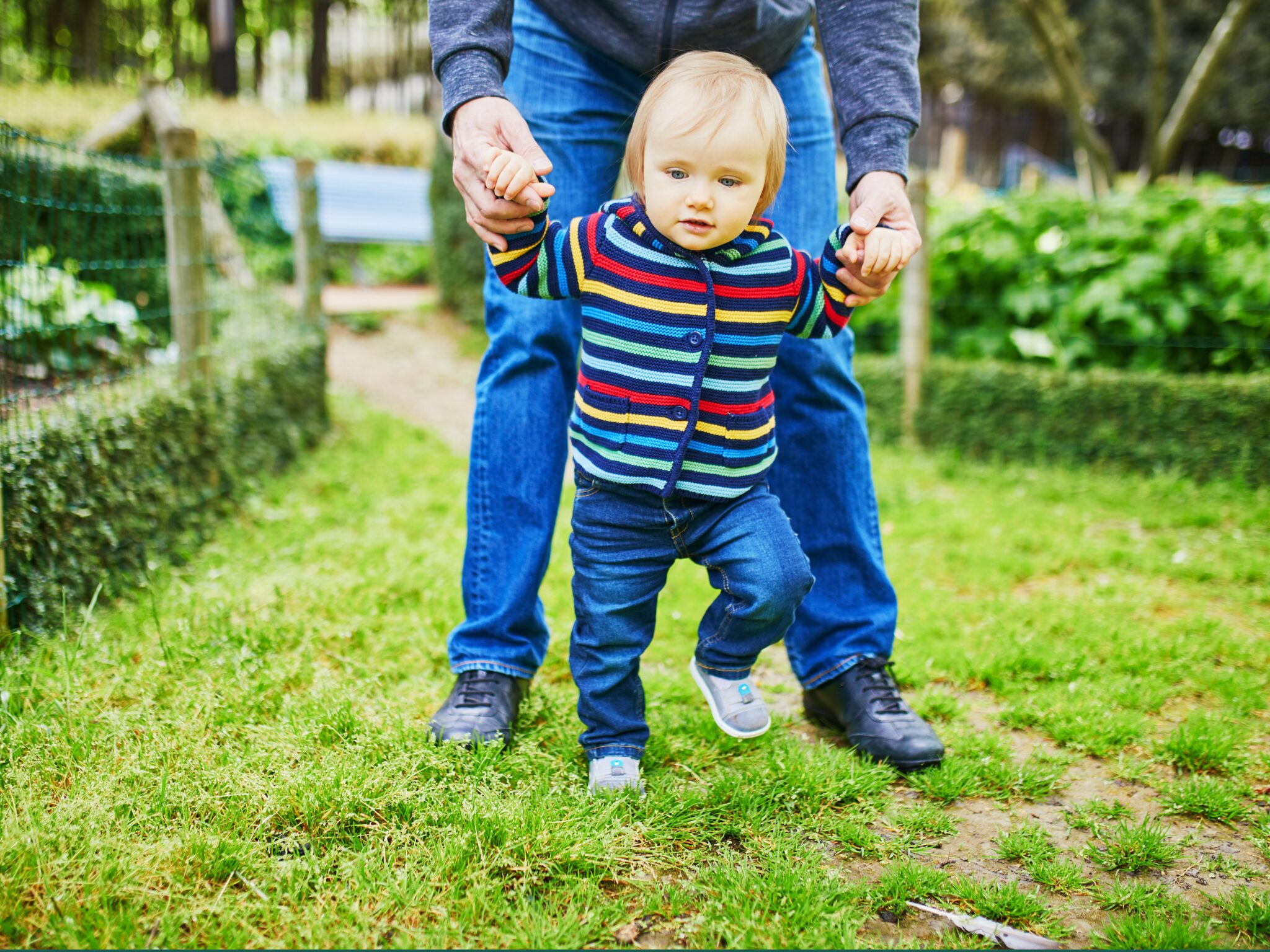
Ferorelli: Just to tack on, the limit case is that no amount of children I do or do not have will change the fossil fuel economy. There’s nothing I can do in my family life that’s going to make a systemic change. That I think is really helpful for people who are really struggling with this, to relieve people of that sort of catastrophic responsibility of having a child who could be the next Greta Thunberg, or not having a child who would emit all this CO2 — that’s not where change is happening.
YCC: In closing, could we talk about your statement that “We’re at a turning point — a moment of radical possibility”? What does it mean to imagine the future for families of all kinds amid climate change?
Ferorelli: You’re catching me on kind of a weird day for this. I live in Chicago and it’s raining in January. And just yesterday I was reading Jim Hansen about how this is the year we’re going to blow by 1.5, and even so, the big question of how do we imagine a different world, sometimes I have to talk to myself like I’m my reader.
We wrote as our best selves and one of the things that was an absolute priority in writing was that we make space for all of the confusion, and the sort of perversity and paradoxes we all experience when we have to have to hold this space. This space is uncomfortable, this issue is painful; it’s costly to do this work.
The window that’s closing on us is the window for moderate solutions, for things remaining basically as they are, and a lot of the changes we’re going to see are going to be really damaging, really painful, and really scary, and some we couldn’t have anticipated.
And even so, we can make changes that are actually better. Nothing about the way we live right now was ever written in stone. Every climate solution that’s justice-based brings with it a host of other knock-on benefits; similarly, any justice-based work on other initiatives is probably good for climate work as well because inequality is a big driver of the climate crisis.
We talk a lot about the world, the future we want to live in and being able to imagine it and being able to move toward it — that is no small feat, that’s a creative task, as well as a lot of work. I think that for people when they just can’t imagine it, rest is the first step, rest and companionship. Take the steps you need to take to be able to imagine it.
This article by Daisy Simmons was originally published on Yale Climate Connections. It is republished here as part of the global journalism collaboration Covering Climate Now.
The post Generation Climate: Should Global Warming Prevent You From Having Kids? appeared first on Green Queen.
This post was originally published on Green Queen.

